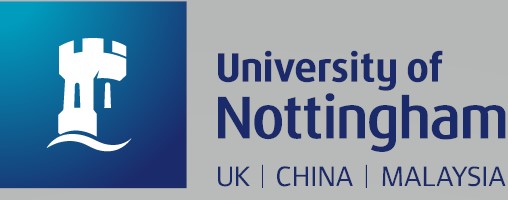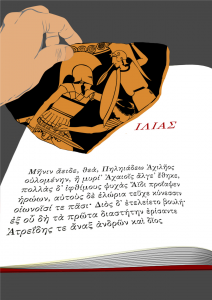
November 29, 2017, by Helen Lovatt
Conference: Building Cohesion and Unity
Angeliki Roumpou announces a conference on combining approaches to the study of the past
2nd December A03 Humanities Building, The University of Nottingham, full details and registration available here
The Department of Classics and the Department of Archaeology within the School of Humanities at the University of Nottingham have recently merged. The research students of the new Department of Classics & Archaeology are organising a one-day conference – our first joint venture – in order to celebrate this union and bring together students and staff working in academic fields involved in the study of the past (Archaeology, Classics, History, Anthropology etc.). The aim of this conference is to explore and compare how different approaches developed in the study of literature, history and material culture can lead to similar or dissimilar interpretations of the past.
merged. The research students of the new Department of Classics & Archaeology are organising a one-day conference – our first joint venture – in order to celebrate this union and bring together students and staff working in academic fields involved in the study of the past (Archaeology, Classics, History, Anthropology etc.). The aim of this conference is to explore and compare how different approaches developed in the study of literature, history and material culture can lead to similar or dissimilar interpretations of the past.
Our Keynote speaker will be Dr Will Bowden, Associate Professor in Roman Archaeology in the University of Nottingham who will present his current research with a talk on The Iceni after Budica: from conflict to community at “Venta Icenorum”.
Panel one “Cohesion and Identity”
The panel will commence with Jasper Donelan’s paper on Polysyndeton in classical Greek oratory, who will focus on Polysyndeton as a figure of speech that lends emphasis by combining discrete elements into a more impressive whole. The next speaker is Thomas Sims whose paper “Let them eat grain!” (Dis)unity in Python’s Agen explores how the disunity within Alexander’s empire is reflected in the surviving fragments of Python’s Agen and how it may have been used to foster unity. Dr Jean Vanden Broeck-Parant, a guest speaker from the University of Oxford, will talk on Maintaining buildings and building cohesion, exploring how renovation projects in Ancient Greece offered a unique opportunity for associations to strengthen their cohesion. Dr Barbara Care, a Visiting Research Fellow at the University of Nottingham “Centre for Spartan and Peloponnesian Studies”, in her talk entitled We are sons of Greece”. On the question of Hellenization and Greek language survival in Calabria (Southern Italy) will show how cohesion between Greek language and Italian is achieved in Calabria so as to produce a unique dialect. The concluding talk for this panel is a joint paper given by Chiara Ravera & Elisa Vecchi, an historian and archaeologist, who will consider how written documents and material evidence can help to unravel the identity of Genoa from its origins to the medieval period. The title of their paper is Genoese is as Genoese does. Ligurian identity through the centuries.
Panel Two “Borders and boundaries”
This panel includes the following papers: Stefanos Apostolou, a Classicist & Carl Dixon, an Historian will give a joint presentation entitled Beyond environmental determinism; aspects of localism, diversity, and human agency in Anatolia, showing how unity through diversity can be achieved, focusing on textual and archaeological evidence from Anatolia during antiquity and the middle ages. Next, Sera Baker on Boundary control and superstition within the shops of Roman Pompeii will discuss how archaeological evidence of aesthetic markers in the small shops of Pompeii functioned as boundary markers. Another joint paper is entitled Rivers and frontiers in the Veronese (north-eastern Italy): The Mincio basin in a long-durée perspective and will be given by an historian, Marco Panato, and an archaeologist, Fabio Saccoccio, who will explore the role played by rivers in a specific case-study area over the long term: the Mincio valley, north-eastern Italy, from the Iron Age until the Middle Ages. The last paper for this panel will be given by David Robinson who will discuss the differing responses by travellers to the Roman Empire over time, in his paper Contesting British identity: British travel-accounts of Italy in the eighteenth and nineteenth centuries.
Panel Three “Combining resources”
This includes papers both by Masters and PhD students. First, Despoina Sampatakou, our MPhil student, in her talk Evidence meets narration: Horse in Mycenaean Greece and the Homeric epics will present the evidence for presence of horses in the Mycenaean funerary record and into the Homeric narrative. Next, Richard Evans, a guest speaker from the University of Leicester, will talk on Unmaking and Remaking Greek International Law: How the Use of International Law can Reveal New Interpretations of the Greek’s Laws of War through a combination of legal theory and ancient evidence. Then, by combining a range of interdisciplinary approaches (psychoanalytical theory, archaeological evidence, quantitative data and literary accounts), our MA student Benjamin White will speak on Rome’s ‘tour-guides’: towards the idea of collective viewing at Rome,) in order to show how external spectators would have found meaning, and perhaps ‘identity’, in the monimenta of Rome through a collective mode of viewing. Our final speaker will be Jamie Smith speaking on Anthropology and Meeting Places at the Eamont Diplomatic Summit: AD. 927 by using an anthropological theory of diplomatic practice to reinterpret the Eamont meeting.
The event will conclude with a general discussion and will be followed by a wine reception.
No comments yet, fill out a comment to be the first

Leave a Reply